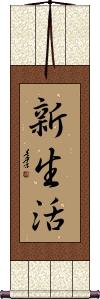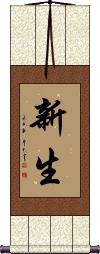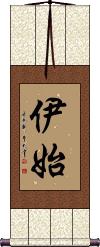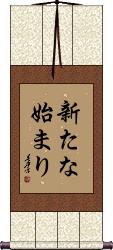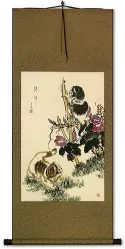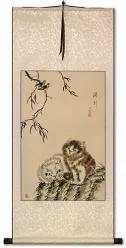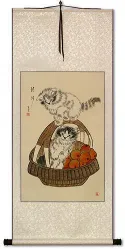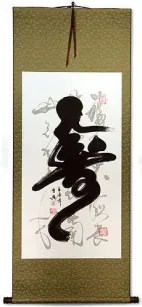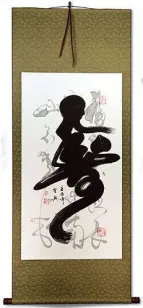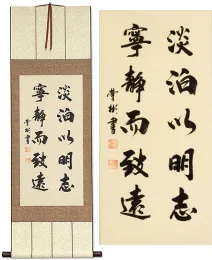Many custom options...
And formats...

Not what you want?
Try other similar-meaning words, fewer words, or just one word.
New Life in Chinese / Japanese...
Buy a New Life calligraphy wall scroll here!
Personalize your custom “New Life” project by clicking the button next to your favorite “New Life” title below...
New Life
This literally means “new life” or “new livelihood” in Japanese Kanji.
新生活 is most appropriate if you are starting a new career or otherwise are starting a new chapter in your life or a new beginning.
Note: This is not the most common word selection for a calligraphy wall scroll. But if you’re a westerner, you can bend the rules a bit.
New Life
新生 literally means “new life” or “new birth” in Chinese, Japanese Kanji, and old Korean Hanja.
Depending on the context, this word can also mean newborn, new student, rebirth, new birth, or nascent.
In Japanese, this can be the given name Wakaki.
Note: This is not the most common word selection for a calligraphy wall scroll. But if you’re a westerner, you can bend the rules a bit.
New Beginning
伊始 is a short version of “new beginning” or simply “beginning” in Chinese characters.
You can also translate this as “from this moment on,” “starting now,” or “henceforth.”
In the day-to-day speech, this word can apply to starting a new job, beginning a new career, entering a new chapter of your life, or taking a new position (in politics, scholarship, etc.).
New Beginning
新たな始まり is a Japanese word that means “new beginning” or “new start.”
Here's the character breakdown:
新た (arata) = new; fresh; novel; newly; freshly; or this can be like the prefix “re-” like “re-start” or “reset.”
な (na) is kind of a connecting article. This glues “new” to “beginning.”
始まり (hajimari) = origin; beginning.
Note: Because this selection contains some special Japanese Hiragana characters, it should be written by a Japanese calligrapher.
New Beginning
This in-stock artwork might be what you are looking for, and ships right away...
Gallery Price: $61.00
Your Price: $33.88
Gallery Price: $72.00
Your Price: $39.88
Gallery Price: $72.00
Your Price: $39.88
Gallery Price: $61.00
Your Price: $33.88
Gallery Price: $61.00
Your Price: $33.88
Gallery Price: $61.00
Your Price: $33.88
Longevity / Long Life Unique Calligraphy Scroll
Discounted Blemished
Gallery Price: $47.00
Your Price: $26.00
Gallery Price: $61.00
Your Price: $33.88
Gallery Price: $31.00
Your Price: $16.88
Decorative Longevity / Long Life Calligraphy Wall Scroll
Discounted Blemished
Gallery Price: $31.00
Your Price: $17.00
Gallery Price: $198.00
Your Price: $109.88
Not the results for new life that you were looking for?
Below are some entries from our dictionary that may match your new life search...
| Characters If shown, 2nd row is Simp. Chinese |
Pronunciation Romanization |
Simple Dictionary Definition |
春 see styles |
chūn chun1 ch`un chun haruji はるじ |
More info & calligraphy: Spring Season(n,adv) (1) spring; springtime; (2) New Year; (3) prime (of life); height (of one's prosperity); heyday; (4) adolescence; puberty; (5) sexuality; sexual desire; (personal name) Haruji |
十戒 see styles |
shí jiè shi2 jie4 shih chieh jukkai じゅっかい |
More info & calligraphy: Ten Commandments(1) (Buddhist term) the 10 precepts; (2) Ten Commandments; Decalogue; Decalog; (surname) Jukkai Śikṣāpada. The ten prohibitions (in Pāli form) consist of five commandments for the layman: (1) not to destroy life 不殺生 pāṇātipātāveramaṇi; (2) not to steal 不倫盜 adinnādānāver; (3) not to commit adultery 不婬慾 abrahmacaryaver.; (4) not to lie 不妄語musāvādāver.; (5) not to take intoxicating liquor 不飮酒 suramereyya-majjapamādaṭṭhānāver. Eight special commandments for laymen consist of the preceding five plus: (6) not to eat food out of regulated hours 不非時食 vikāla-bhojanāver.; (7) not to use garlands or perfumes 不著華鬘好香塗身 mālā- gandha-vilepana-dhāraṇa-maṇḍana-vibhūṣanaṭṭhānā; (8) not to sleep on high or broad beds (chastity) 不坐高廣大牀 uccāsayanā-mahāsayanā. The ten commandments for the monk are the preceding eight plus: (9) not to take part in singing, dancing, musical or theatrical performances, not to see or listen to such 不歌舞倡伎不往觀聽 nacca-gīta-vādita-visūkadassanāver.; (10) to refrain from acquiring uncoined or coined gold, or silver, or jewels 不得捉錢金銀寶物 jātarūpa-rajata-paṭīggahaṇāver. Under the Māhayāna these ten commands for the monk were changed, to accord with the new environment of the monk, to the following: not to kill, not to steal, to avoid all unchastity, not to lie, not to slander, not to insult, not to chatter, not to covet, not to give way to anger, to harbour no scepticism. |
新生 see styles |
xīn shēng xin1 sheng1 hsin sheng wakaki わかき |
More info & calligraphy: New Life(n,vs,vi) rebirth; new birth; nascent; (given name) Wakaki newly arisen |
更生 see styles |
gēng shēng geng1 sheng1 keng sheng tsugio つぎお |
More info & calligraphy: Rehabilitation / Rebirth(noun/participle) (1) rehabilitation; remaking one's life; starting life anew; (noun/participle) (2) rebirth; regeneration; reorganization; rebuilding; recovery; restoration; remaking; (noun/participle) (3) coming back to life; revival; resuscitation; (given name) Tsugio rebirth |
新生活 see styles |
shinseikatsu / shinsekatsu しんせいかつ |
More info & calligraphy: New Life |
重新做人 see styles |
chóng xīn zuò rén chong2 xin1 zuo4 ren2 ch`ung hsin tso jen chung hsin tso jen |
More info & calligraphy: Fresh Start |
初め see styles |
hajime はじめ zome ぞめ |
(n-t,n-adv) (1) beginning; start; outset; opening; (2) first (in line, etc.); (3) origin; (4) (kana only) such as ...; not to mention ...; (suffix) first doing of ... (ever, in one's life, in the new year, etc.) |
大壽 大寿 see styles |
dà shòu da4 shou4 ta shou |
(polite) birthday making the beginning of new decade of life for an older person, especially over 50 years old (e.g. 60th or 70th birthday) See: 大寿 |
學名 学名 see styles |
xué míng xue2 ming2 hsüeh ming |
scientific name; Latin name (of plant or animal); (according to an old system of nomenclature) on entering school life, a formal personal name given to new students See: 学名 |
投生 see styles |
tóu shēng tou2 sheng1 t`ou sheng tou sheng |
reborn (of departed spirit); to be reincarnated; to leave home for a new life |
續命 续命 see styles |
xù mìng xu4 ming4 hsü ming zokumyō |
to prolong life; to extend one's lifespan; (fig.) to enable something to keep going; to give something a new lease on life (Prayers for) continued life, for which the 續命神幡 flag of five colours is displayed. |
退居 see styles |
taikyo たいきょ |
(noun/participle) (1) retirement from active life; (noun/participle) (2) (recent meaning) moving out of accommodation; finding a new residence |
門出 see styles |
monde もんで |
(noun/participle) (1) leaving one's own house (e.g. when going to war); departure; setting out; (2) starting a new life; starting life anew; (surname) Monde |
首途 see styles |
shuto しゅと kadode かどで |
(noun/participle) (1) leaving one's own house (e.g. when going to war); departure; setting out; (2) starting a new life; starting life anew |
第二春 see styles |
dì èr chūn di4 er4 chun1 ti erh ch`un ti erh chun |
(lit.) second spring; (fig.) falling in love for the second time; a new lease of life; rebirth |
九死一生 see styles |
jiǔ sǐ yī shēng jiu3 si3 yi1 sheng1 chiu ssu i sheng kyuushiisshou / kyushissho きゅうしいっしょう |
nine deaths and still alive (idiom); a narrow escape; new lease of life (yoji) narrow escape from the jaw of death |
Variations: |
zome ぞめ |
(suffix) (after the -masu stem of a verb) first doing of ... (ever, in one's life, in the new year, etc.) |
半路出家 see styles |
bàn lù chū jiā ban4 lu4 chu1 jia1 pan lu ch`u chia pan lu chu chia |
lit. to enter monastic life at a mature age (idiom); fig. to change one's career; to take up a new line of work or specialization; to enter a profession from a different background |
搖身一變 摇身一变 see styles |
yáo shēn yī biàn yao2 shen1 yi1 bian4 yao shen i pien |
to change shape in a single shake; fig. to take on a new lease of life |
枯木逢春 see styles |
kū mù féng chūn ku1 mu4 feng2 chun1 k`u mu feng ch`un ku mu feng chun |
lit. the spring comes upon a withered tree (idiom); fig. to get a new lease on life; to be revived; (of a difficult situation) to suddenly improve |
Variations: |
kadode; shuto(首途); kadoide(ok) かどで; しゅと(首途); かどいで(ok) |
(n,vs,vi) (1) setting off (on a long journey); setting out; departure (e.g. for the front); leaving home; (n,vs,vi) (2) starting a new life; starting life anew |
風穴をあける see styles |
kazaanaoakeru / kazanaoakeru かざあなをあける |
(exp,v1) (1) to penetrate a body (e.g. with a spear or bullet); (2) to breathe new life into |
風穴を開ける see styles |
kazaanaoakeru / kazanaoakeru かざあなをあける |
(exp,v1) (1) to penetrate a body (e.g. with a spear or bullet); (2) to breathe new life into |
新風を吹き込む see styles |
shinpuuofukikomu / shinpuofukikomu しんぷうをふきこむ |
(exp,v5m) to breathe new life into; to usher in a new phase; to break the mold |
Variations: |
chinkoro; chinkoro ちんころ; チンコロ |
(noun/participle) (1) (slang) tip-off (to the authorities); information (on); anonymous report; telling on (someone); (2) {food} chinkoro (traditional lucky sweet in shapes of various animals sold at new year's events, predominantly in Niigata prefecture); (3) (slang) person of low status; low-life; powerless person; (4) (abbreviation) (colloquialism) (See チンチロリン・4) cee-lo (dice gambling game); (5) girls' hair accessory (used to hide hair knots, for the Shichi-go-san festival) |
Variations: |
mukaeru むかえる |
(transitive verb) (1) to go out to meet; to receive; to welcome; to greet; to salute; to hail; (transitive verb) (2) to call for; to summon; to invite; (transitive verb) (3) to accept (e.g. as a member of a group or family); to take (e.g. a wife); (transitive verb) (4) to reach (a certain time, a point in one's life, etc.); to enter (a new phase, new era, etc.); to approach (e.g. death) |
Variations: |
daininojinsei / daininojinse だいにのじんせい |
(exp,n) (See セカンドライフ) new life (esp. after retirement); postretirement life |
Variations: |
namanamashii / namanamashi なまなましい |
(adjective) (1) vivid (memory, description, etc.); fresh; graphic; raw; true-to-life; first-hand (experience); (adjective) (2) fresh (blood, scar, etc.); still new; recent; just occurred |
Variations: |
kazaanaoakeru / kazanaoakeru かざあなをあける |
(exp,v1) (1) to penetrate a body (e.g. with a spear or bullet); (exp,v1) (2) to breathe new life into; to provide a potential solution |
Variations: |
mukaeru むかえる |
(transitive verb) (1) to go out to meet; to receive; to welcome; to greet; to salute; to hail; (transitive verb) (2) to call for; to summon; to invite; (transitive verb) (3) to accept (e.g. as a member of a group or family); to take (e.g. a wife); (transitive verb) (4) to reach (a certain time, a point in one's life, etc.); to enter (a new phase, new era, etc.); to approach (e.g. death) |
Click here for more new life results from our dictionary
The following table may be helpful for those studying Chinese or Japanese...
| Title | Characters | Romaji (Romanized Japanese) | Various forms of Romanized Chinese | |
| New Life | 新生活 | shin sei katsu shinseikatsu | ||
| New Life | 新生 | waka ki / wakaki | xīn shēng xin1 sheng1 xin sheng xinsheng | hsin sheng hsinsheng |
| New Beginning | 伊始 | yī shǐ / yi1 shi3 / yi shi / yishi | i shih / ishih | |
| New Beginning | 新たな始まり | arata na hajimari aratanahajimari | ||
| New Beginning | 新的開始 新的开始 | xīn de kāi shǐ xin1 de kai1 shi3 xin de kai shi xindekaishi | hsin te k`ai shih hsintekaishih hsin te kai shih |
|
| In some entries above you will see that characters have different versions above and below a line. In these cases, the characters above the line are Traditional Chinese, while the ones below are Simplified Chinese. | ||||
Successful Chinese Character and Japanese Kanji calligraphy searches within the last few hours...
